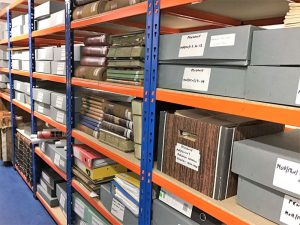The Morrab Library in Cornwall has a network of volunteers who undertake cataloguing of individual archive collections that are uploaded to Discovery via Manage Your Collections.
Brief introduction to your archive and collections
Founded in 1818, the Morrab Library is an independent subscription library situated in a Victorian house within the Morrab Gardens in Penzance, Cornwall. Established before the first public library in Penzance, its collections have a strong Cornish remit, with many collections either about Cornwall or by Cornish authors. It holds around 70,000 books, a large Cornish newspaper archive, and hosts a successful in-house digitisation programme for the circa 15,000 historic photographs managed by volunteers. The Morrab Library also holds approximately 45 metres of unique archive material. This collection comprises a variety of manuscripts and documents with varied provenance, collected over 200 years, although the majority derives from significant local families and dignitaries. Alongside the manuscripts, the collection also includes artwork (drawings, sketches, paintings, and topographical studies), historic maps, and important ephemera. Overall, this comprises around 10,000 items.

The Morrab Library’s archives
Deciding to use Manage Your Collections
The archive collection was catalogued in great detail over twenty years by a dedicated volunteer, but in hard copy only and not to ISAD(G) standards. A brief, general subject index, posted on the library’s website, was developed by the Honorary Librarian in 2002, which refers users to relevant collections, but it is very limited in its scope and lacking detail. We needed to find a way to make our collections searchable and accessible by not only our members but the wider community as well. Following the awarding of a scoping grant from The National Archives to allow the engagement of a consultant archivist, we decided that Manage Your Collections (MYC) would be our best option to publish our index online and reach the widest possible audience. Much of this consideration did come down to cost, but other issues such as ease of use (allowing for volunteer participation), the lack of need for a qualified archivist to undertake the work, and the potential audience reach of Discovery, were also important considerations.
Your approach to cataloguing collections for publication online
What we lack in finances, we more than make up for with willing volunteers, and using MYC allows us to make use of their skills to generate records with minimal cost. We have to date recruited a team of seven volunteers who undertake the data entry. To ensure initial enthusiasm, each volunteer was able to choose a collection that was of interest to them, so that they could enjoy seeing and handling the collections as they created records. This approach also helped them gain confidence in their interpretation and judgement skills when the need to enhance particular records arose. Many have been able to add additional information to a record based on their own knowledge or research skills.
Each volunteer is given a copy of the index to the collection they are working on. They can then choose to enter the data from that into the MYC spreadsheet either in the library or at home. They all then spend time with the actual collections, checking each item against the record to make sure it’s accurate. They will enhance the record if need be at this stage, and report on its physical condition – any immediate conservation can be undertaken, or else it is reported for later attention. This methodology also acts as a stock-take for the collection. The completed records are then sent to the librarian for quality checking and uploaded to Discovery.
Given the size of the collections, this exercise will take some years. We’re lucky that many of our ‘star’ collections, which are likely to attract most interest from external researchers, often correspond with the interests of our volunteers, so there has been no problem with determining priorities so far.
What value do you see in getting your collections information published via an online platform?
We see the following benefits and value in getting our collections information online:
- Searchable records – with a paper index, it’s very difficult to undertake searches for specific information. Answering enquiries is very time-consuming and we always worry we may be missing important information and therefore opportunities to assist. Being able to search across our records via keywords will make a vast difference.
- By knowing what we hold, we will be much better placed to promote our collections to our members and encourage access and wider use of the collections. This could also help us to attract new members.
- Discovery will help external researchers, whether they’re local, from across the UK or even international, understand what we hold and how we can assist their work.
- Having a searchable collection will help with sourcing funding and applying for grants. Knowledge of the full extent of collections and subjects shows the importance, and the potential of our collections.
- Online catalogues widen our scope for partnerships – discovering and highlighting collections on particular subjects we haven’t previously promoted or understood could be of interest to other organisations and lead to wider collaboration.
- Improved knowledge of our collections will enhance our social media programme. We already feature the archives collections a lot, but it can often be drawn from the same known collections.
- Better understanding of our collections will allow wider opportunities for talks, displays, exhibition loans and other events.
Contact the archive
Lisa Di Tommaso, Librarian, librarian@morrablibrary.org.uk